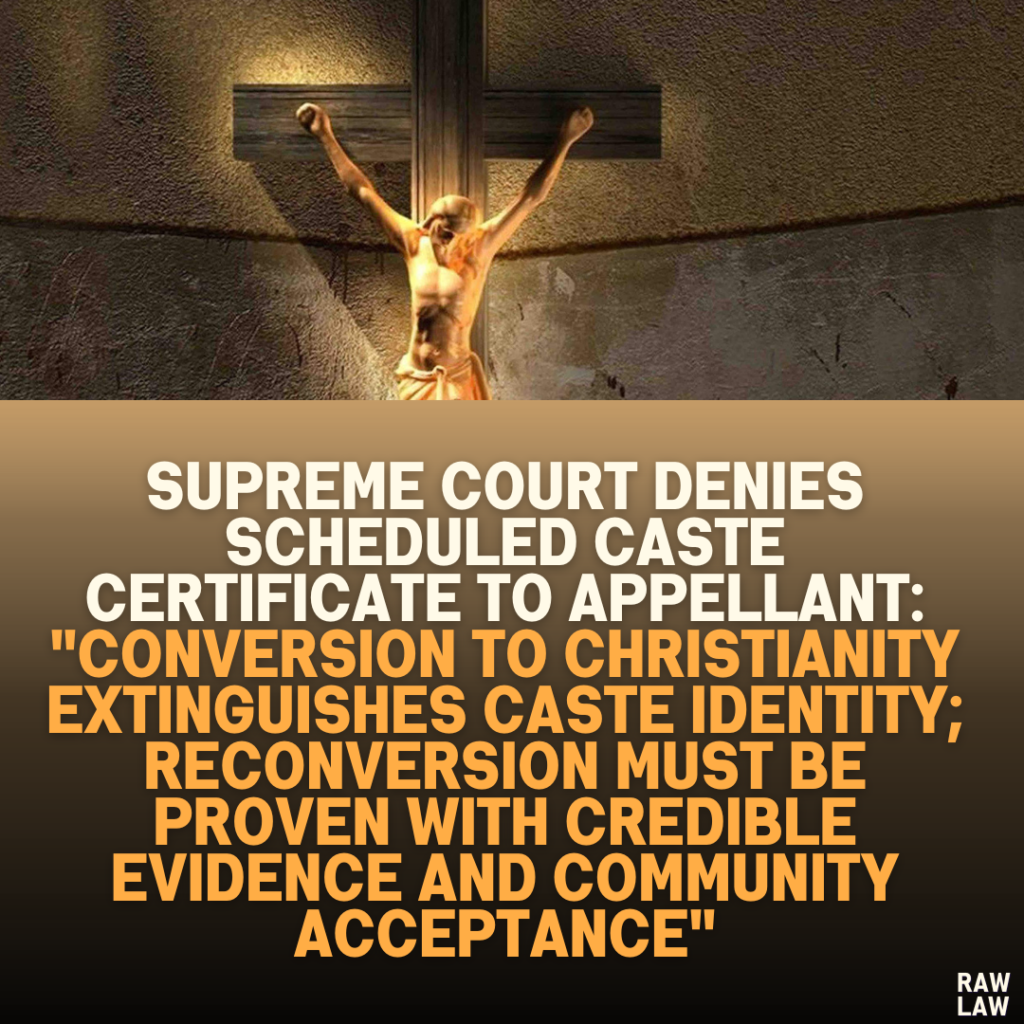Court’s Decision:
The Supreme Court dismissed the appellant’s plea for issuance of a Scheduled Caste (SC) community certificate, ruling that her claim to belong to the Valluvan caste, recognized as an SC under the Constitution (Pondicherry) Scheduled Castes Order, 1964, was unsustainable. The Court stated, “Conversion to another religion extinguishes caste identity, and reconversion must be proven with credible evidence to restore such status.”
Facts of the Case:
- The appellant was born to a Christian father and a Hindu mother in Puducherry. Her father was a Christian by conversion, while her mother claimed to have reverted to Hinduism after marriage.
- The appellant, baptized at an early age, claimed to have practiced Hinduism throughout her life and relied on Scheduled Caste certificates issued to herself, her father, and her brother in previous instances.
- She applied for a Scheduled Caste certificate to avail herself of reservations for a public employment position but was rejected by the authorities, who cited her baptism and continued practice of Christianity.
Issues:
The Court considered whether the appellant, who was baptized as a Christian and practiced Christianity, could claim Scheduled Caste status based on her alleged reconversion to Hinduism.
Petitioner’s Arguments:
- Inheritance of Caste Identity:
- The appellant argued that caste is an inherent attribute tied to birth and remains under an “eclipse” during conversion to Christianity, revivable upon reconversion to the original religion.
- She claimed her adherence to Hindu practices, such as temple visits, and highlighted her mother’s reconversion as evidence of her own Hindu identity.
- Legal Precedents:
- The appellant relied on judgments such as S. Anbalagan v. B. Devarajan, which held that reconversion to Hinduism does not require specific ceremonies and is valid if the caste community accepts the individual.
- Kailash Sonkar v. Maya Devi was cited to assert that caste identity revives automatically upon reconversion to the original religion.
- Genuine Faith:
- She contended that her religious practices and familial ties established her Hindu identity, and the denial of an SC certificate was arbitrary and unconstitutional.
Respondent’s Arguments:
- Contradictory Evidence:
- The respondents presented evidence, including the appellant’s baptismal records and parental marriage under Christian rites, which indicated her consistent practice of Christianity.
- Village Administrative Officers and local inquiries further confirmed that the appellant regularly attended church services.
- Lack of Reconversion:
- The respondents argued that no formal steps for reconversion, such as a public declaration or ceremonies, were undertaken. Statements of community acceptance were deemed insufficient to establish genuine reconversion.
- Fraudulent Claims:
- The issuance of earlier SC certificates to the appellant and her family was questioned as irregular. The authorities argued that allowing the appellant to claim dual religious identities would undermine constitutional protections and perpetuate fraud on the reservation system.
Analysis of the Law:
- Constitutional Framework:
- Article 341 of the Indian Constitution allows the President to designate Scheduled Castes for specific regions, but it explicitly excludes individuals practicing religions other than Hinduism, Sikhism, or Buddhism from being classified as Scheduled Castes.
- Conditions for Reconversion:
- Relying on precedents such as KP Manu v. Chairman, Scrutiny Committee, the Court emphasized three criteria:
- Clear evidence that the individual belongs to a Scheduled Caste recognized under the Presidential Order.
- Proof of reconversion to the original religion.
- Acceptance by the caste community.
- Relying on precedents such as KP Manu v. Chairman, Scrutiny Committee, the Court emphasized three criteria:
- Disqualifications Due to Christianity:
- As per the Constitution (Pondicherry) Scheduled Castes Order, 1964, individuals professing Christianity are categorized under Other Backward Classes (OBC) and not Scheduled Castes.
- Judicial Precedents:
- In S. Rajagopal v. C.M. Armugam, the Court held that conversion to Christianity extinguishes caste identity, as Christianity does not recognize caste classifications. Reconversion must be supported by community acceptance and public evidence.
Precedent Analysis:
- Kailash Sonkar v. Maya Devi: Established that caste identity could revive upon reconversion if the community accepts the individual.
- State of Maharashtra v. Ravi Prakash Babulalsing Parmar: Affirmed that fraudulent claims to caste benefits subvert the reservation system and amount to constitutional fraud.
- Food Corporation of India v. Jagdish Balaram Bahira: Emphasized that reservation benefits cannot be extended to impostors who defraud the system.
Court’s Reasoning:
- The Court held that the appellant’s claim lacked credible evidence of reconversion. Her baptismal records, regular church attendance, and parental marriage under Christian rites indicated a continued affiliation with Christianity.
- The Court noted the absence of public declarations or ceremonies to substantiate her alleged reconversion to Hinduism, such as those conducted by Arya Samaj.
- The issuance of SC certificates to the appellant and her family was deemed irregular, and their validity could not override the evidence gathered during the inquiry.
- The appellant’s claim of reconversion appeared motivated by the desire to avail reservation benefits rather than genuine religious adherence.
Conclusion:
The Court concluded that the appellant was not entitled to a Scheduled Caste community certificate, ruling that:
- Conversion to Christianity extinguishes caste identity.
- Reconversion must be substantiated by clear evidence, community acceptance, and adherence to prescribed customs.
The appeal was dismissed, and the appellant’s claims were deemed contrary to the principles of reservation enshrined in the Constitution.
Implications:
- The judgment reinforces the strict criteria for claiming SC status, emphasizing the need for clear evidence of reconversion.
- It discourages fraudulent or opportunistic claims, preserving the integrity of the reservation system.
- The ruling clarifies the distinction between caste identity and religious practice, ensuring that constitutional benefits are not misused.
This decision is likely to serve as a precedent for similar cases involving disputes over caste status and conversion.
